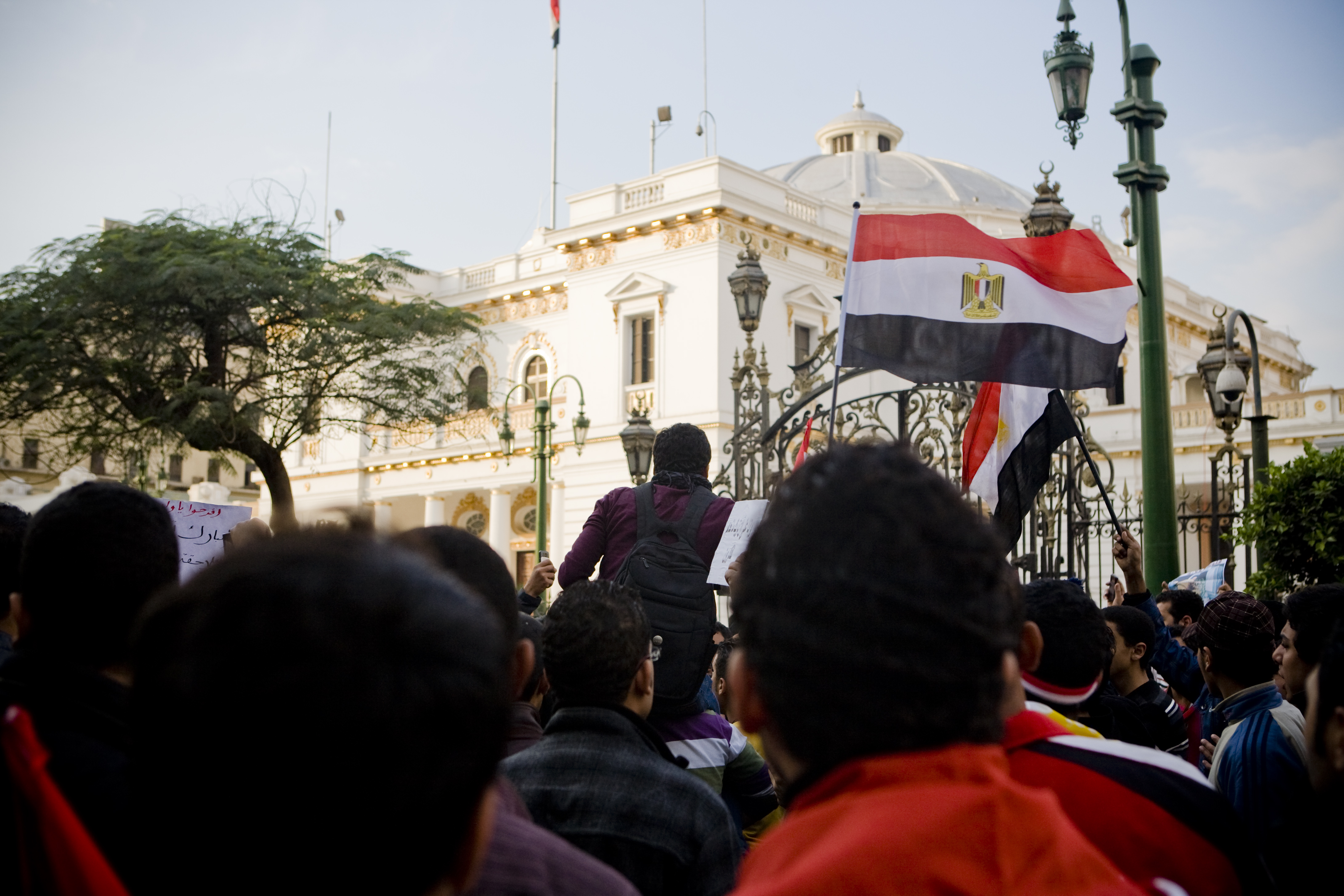On February 23, two members of the Egyptian parliament – businessman Mahmoud Khamis and controversial TV anchor Tawfik Okasha – physically attacked two reporters covering the ongoing parliamentary session. According to Khamis, it was “impolite” of a photographer from Al-Watan newspaper to photograph Okasha, who was expelled from the hall for repeatedly interrupting the parliamentary speaker. Okasha also criticized the speaker and called the journalists at the session “police informers.”
The Journalists’ Syndicate responded the next day by calling on all reporters to boycott the parliament, as it is “the role of the people’s representatives to defend citizens’ rights, not to assault them and those who transmit the truth,” adding that the syndicate will not tolerate the repetition of such violations. Newly elected parliament speaker Ali Abdel-Aal responded by expressing his “deep respect” for the media, and urged the Journalists’ Syndicate not to boycott the parliament.
This is only the latest development in the quickly deteriorating situation of, arguably, contemporary Egypt’s most important institution. On January 12, during what was only the third parliamentary session, speaker Ali Abdel-Aal announced the temporary ban of all live news broadcasts of the legislative body’s sessions. The parliament passed this decision following a quick vote, after the world watched as this parliament’s first two sessions were marred by insults, confusion and absolute chaos. It is also worth mentioning that parliamentarians made this decision despite the fact that 81 percent of Egyptians – the people the parliament represents – are in favor of live televised sessions, according to a recent Baseera poll.
The ban arrived at a crucial time for Egypt, as the parliament – the first under the new constitution and under Abdel Fattah al-Sisi’s presidency – was on the verge of reviewing and ratifying almost 340 laws and decrees issued in its absence during the past three years. Some of these laws – such as the civil service law, investment law, the law on the Suez Gulf economic zone and the criminal laws restricting freedoms and civil society, to name a few – carry huge significance for the future of the country.
The decision to ban the broadcasts was met with widespread criticism and even a lawsuit by the Association for Freedom of Thought and Expression (AFTE), citing Article 120 of the constitution, which states: “The sessions of the House of Representatives are held in public. The House may hold a closed session based on a request by the president of the republic, the speaker of the House, or at least 20 of its members. The House will decide by majority whether the debate in question takes place in a public or a closed session.”
However, Abdel-Aal denounced the conduct of some cameramen at the sessions and defended the decision, claiming that it does not contradict the constitution because select members of the media will still be allowed to cover the sessions, while the state-owned parliament channel, Sawt Al Sha’b (Voice of the People) will broadcast select recordings of the sessions.
After successive waves of media criticism following the decision, Abdel-Aal asserted that live broadcasts would only remain off-air for 15 days until the members of parliament reviewed the laws, after which broadcasting would resume as normal. When the 15-day deadline came and went with no change, MP Mohamed Anwar El Sadat promised that live broadcasting would instead return with President al-Sisi’s scheduled speech in front of parliament on February 7, while MP Sahar El Hawary insisted that broadcasting would resume after the parliament’s internal bylaws are finalized.
Nothing changed after President al-Sisi’s speech, which means that the closest foreseeable date for the return of the broadcasts is the day on which the parliament finalizes its internal bylaws.
As you can imagine, these bylaws will be of critical importance in determining how the parliament will function for years to come. Egypt’s cabinet was supposed to present the government’s program to the parliament by the end of February or in early March, once the bylaws are agreed upon. According to Minister of Legal and Parliamentary Affairs Magdy El-Agaty, however, the date of this critical session will probably also be postponed, as the parliament is extremely slow in approving the new bylaws.
According to Article 146 of the constitution, the cabinet, led by the prime minister whom Sisi appointed, must present its program to the arliament during its preliminary session of parliament (after approving the bylaws). A majority vote of confidence in the cabinet and its program is required within 30 days of its formation. If a majority vote is not reached, the president appoints another prime minister based on the majority party or coalition. If the parliament does not agree on the plan of the new prime minister either, then the parliament is dissolved and new parliamentary elections take place.
This indicates that the parliament has a huge task ahead of it with serious implications. In addition to ratifying the almost-350 laws, approving the internal bylaws and voting on the cabinet’s program (all within a couple of weeks), the parliament also has a host of other issues to deal with. MP Tawfik Okasha is being investigated for insulting the Speaker of Parliament last week. Fellow controversial MP Mortada Mansour is wasting crucial time attempting to have one of the most popular political talk shows on Egyptian TV, AlQahera Al Youm, suspended for personal issues with the host, Amr Adeeb. Furthermore, the president has just ordered the Interior Ministry to submit urgent legislative amendments to parliament within 15 days that will address increasing police abuse against citizens, after several protests against police violence erupted last weekend in response to the murder of a taxi-driver by a policeman. Former MP Sirri Siam’s resignation was also accepted, making him the first MP to resign from his post in the new parliament. All of these events have occurred during the past week only, and it doesn’t seem likely that they will be stopping any time soon.
It is extremely important that the parliament, despite the chaos that it is trying to hide from the eyes of the world, resumes broadcasting its sessions live for the public to view. Egypt is going through a critical period that will define its future path and determine its success or failure. The laws being ratified and the bylaws being approved will exist for the foreseeable future, and it is only right that the public take part in this process.
It is ridiculous to allow the parliament to pick and choose what it would like the public to see. This almost guarantees the withholding of facts and the manipulation of the information that is being released to the public. Even the select journalists allowed to cover the sessions are being intimidated by MPs, something inconceivable in any democracy around the world.
A public discussion and debate must take place around the present talks in parliament, as isolating the people from their representatives will only serve to increase anger and resentment in the streets. Egypt is struggling with making the concept of citizenship a part of the democratic process, and this is directly linked to developments in communication. Parliamentary channels are key to democracy and the full exercise of citizens’ rights; it is therefore imperative that transparency be restored to the legislative body that represents the people.
It is worth mentioning that Egypt is not the first country to face this dilemma. In 1979, when the United States House of Representatives first began televising coverage of its daily sessions on the network C-SPAN, the Senate originally opposed live televised coverage. Many senators expressed concern that televising proceedings would significantly change the conduct of the legislative process. In 1986, however, Senate floor leaders officially proposed live television coverage of the Senate and in June of that year, daily proceedings began broadcasting on the C-SPAN 2 network.
The US has never looked back, as its public became more involved in the political process, while members of Congress took their job more seriously, knowing that their constituents were literally watching them. Today, live sessions are also available online in most developed and developing countries, including the US, the UK, Canada, Holland, and even Palestine.[i]
Unfortunately, however, there is a wave of opposition against the return of broadcasts from within the Egyptian parliament. MP Mustafa Bakri was quoted by Al Shorouk newspaper as saying: “The decision was made to limit disturbances and to prevent some MPs from exploiting live coverage to put on a show.”
Meanwhile, MP Osama Heikal has insisted that the ban on broadcasting will continue, while claiming “no parliament in the world broadcasts its sessions live, but rather, they allow media to attend the sessions and deliver reports on them to the public.” This, clearly, is a lie.
It is imperative that the Egyptian people not allow a few MPs to ruin any progress that might come out of this parliament. It was never an expectation that MPs like Mortada Mansour, Tawfik Okasha and Mostafa Bakri would offer much with respect to freedom of speech to this country, but it is scary to see these radically right-wing conservative individuals dominating the parliament and deciding the direction it will take in drawing Egypt’s future, without any kind of public resistance or awareness. If the people of this country are again denied the right to define their own future and select their own path, it is very likely that history will repeat itself.
It is up to the liberal and moderate factions within the parliament to put an end to the increasing elements of fascism and totalitarianism that were not even present during the Brotherhood-controlled parliament of 2012. Let’s not forget that even then, the public was allowed to view every single minute of parliamentary sessions live on TV— so this decision represents, even by those low standards, a huge step back.
Laws must be written for the people by the people, and without the public’s oversight, private interests will almost definitely influence the performance and voting of MPs who will have no one to answer to. After all, how are constituents expected to evaluate the performance of their representatives, and on what information are they to base their following vote if they are clueless as to how the latter are performing in session?
If this were a democracy, I would call on all readers to contact their districts’ MPs by phone and mail and demand that they propose re-establishing broadcasts of parliamentary sessions before, or at the very least on, the date that the cabinet presents its program to parliament…but who are we kidding?







Comments (0)